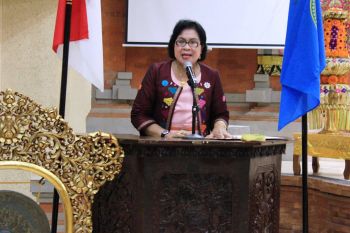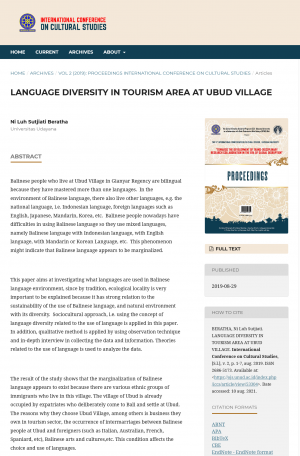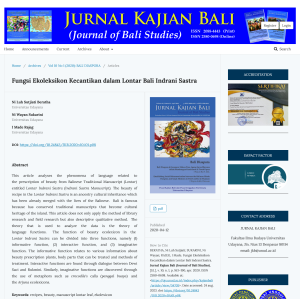- Full Name
- Ni Luh Sutjiati Beratha
- Pen Name
- Photograph by
- Link to Photograph
- Website for biography
- Place
- Denpasar
- Related Music
- Related Books
- Related Scholars Articles
Biography
In English
She has occupied positions as: Secretary of Udayana University Language Centre in 1996 – 1997; the in 1998 – 2000 as the Secretary of School of Graduate Studies Udayana University; from 2000 – 2006 she was the Deputy Director of Financial Affair of School of Graduate Studies Udayana University, and from 2006 – January 2010 was a Deputy Director of Academic Affair of School of Graduate Studies Udayana University. She was the Dean of the Faculty of Arts Udayana University from 2015 until 2019, and has published books, dictionaries, and other publications.
Her interest is conducting research on ‘New Englishes’ used by tourism workers in Bali. She was selected as the best lecturer at Udayana University in 1994, and as the best presenter in research in 2011 by Directorate general of National Research Centre and Social Services of Indonesian Republic.In Balinese
In Indonesian
Pernah menduduki posisi sebagai: Sekretaris Pusat Bahasa Universitas Udayana pada tahun 1996 – 1997; tahun 1998 – 2000 sebagai Sekretaris Sekolah Pascasarjana Universitas Udayana; dari tahun 2000 – 2006 menjadi Wakil Direktur Bidang Keuangan Sekolah Pascasarjana Universitas Udayana, dan dari tahun 2006 – Januari 2010 menjadi Wakil Direktur Bidang Akademik Sekolah Pascasarjana Universitas Udayana. Ia pernah menjabat sebagai Dekan Fakultas Seni Rupa Universitas Udayana dari tahun 2015 hingga 2019, dan telah menerbitkan buku, kamus, dan publikasi lainnya.
Minatnya adalah melakukan penelitian tentang 'New Englishes' yang digunakan oleh para pekerja pariwisata di Bali. Ia terpilih sebagai dosen terbaik di Universitas Udayana tahun 1994, dan sebagai presenter penelitian terbaik tahun 2011 oleh Direktorat Jenderal Pusat Penelitian Nasional dan Pelayanan Sosial Republik Indonesia.Examples of work
they have mastered more than one language. In the environment of Balinese language, there also live other languages, e.g. the national language, i.e. Indonesian language, foreign languages such as English, Japanese, Mandarin, Korea, etc. Balinese people nowadays have difficulties in using Balinese language so they use mixed languages, namely Balinese language with Indonesian language, with English language, with Mandarin or Korean Language, etc. This phenomenon might indicate that Balinese language appears to be marginalized. This paper aims at investigating what languages are used in Balinese language environment, since by tradition, ecological locality is very important to be explained because it has strong relation to the sustainability of the use of Balinese language, and natural environment with its diversity. Sociocultural approach, i.e. using the concept of language diversity related to the use of language is applied in this paper. In addition, qualitative method is applied by using observation technique and in-depth interview in collecting the data and information. Theories related to the use of language is used to analyze the data. The result of the study shows that the marginalization of Balinese language appears to exist because there are various ethnic groups of immigrants who live in this village. The village of Ubud is already occupied by expatriates who deliberately come to Bali and settle at Ubud. The reasons why they choose Ubud Village,
among others is business they own in tourism sector, the occurrence of intermarriages between Balinese people at Ubud and foreigners (such as Italian, Australian, French, Spaniard, etc), Balinese arts and cultures,etc. This condition affects the choice and use of languages.








Enable comment auto-refresher